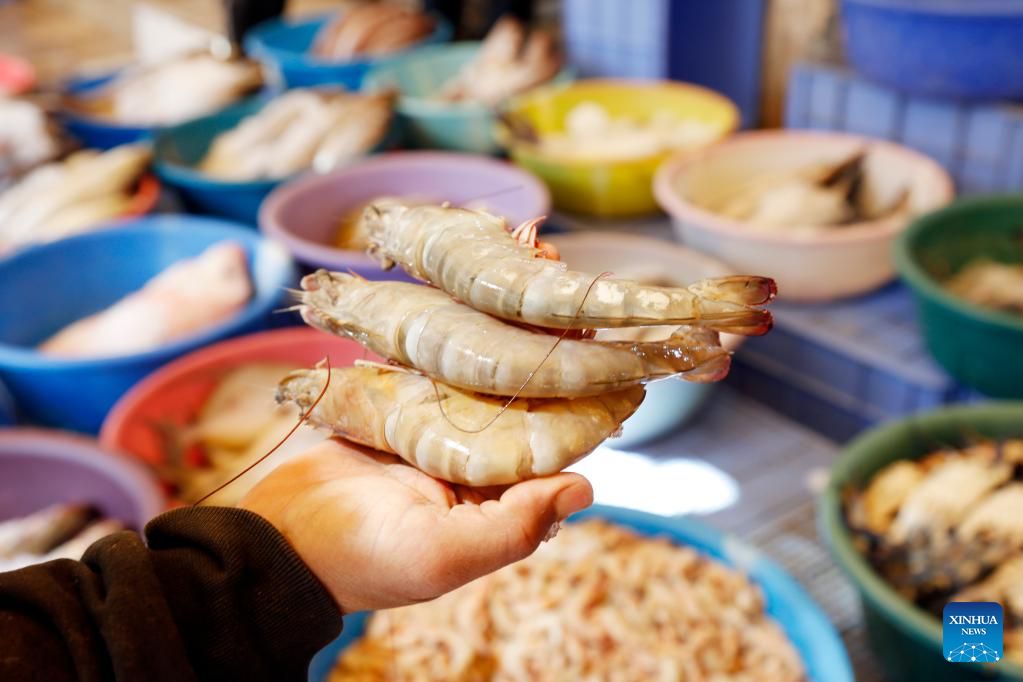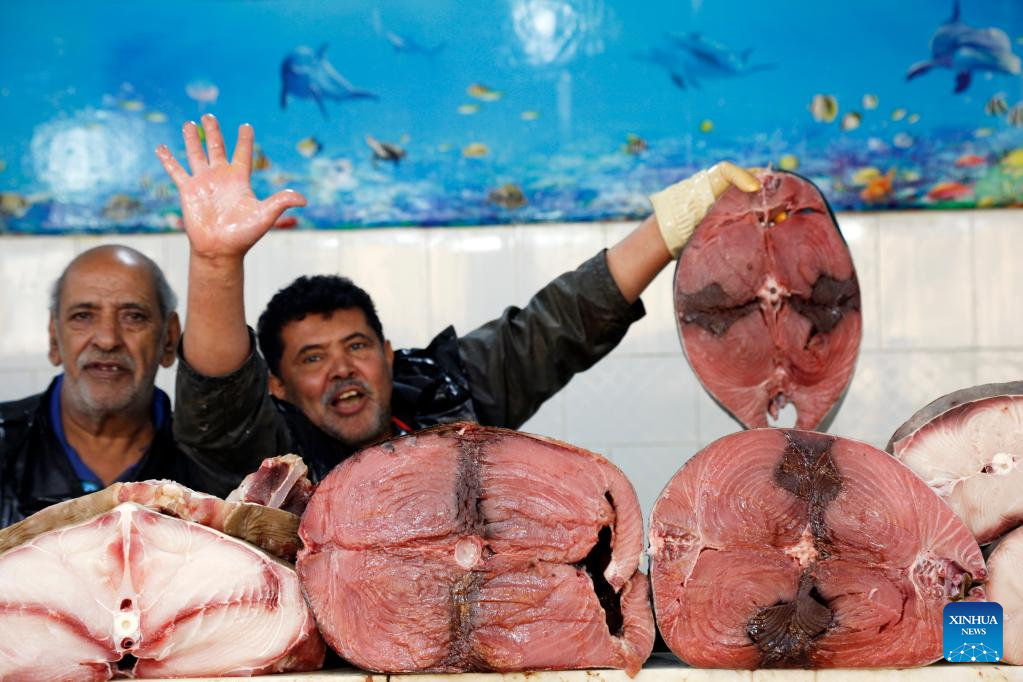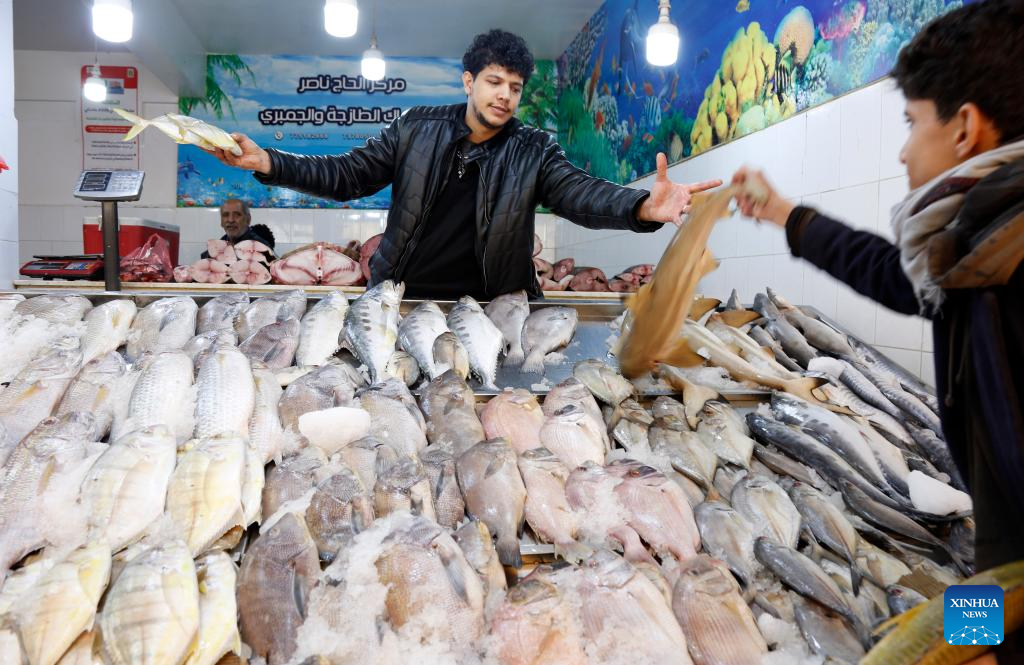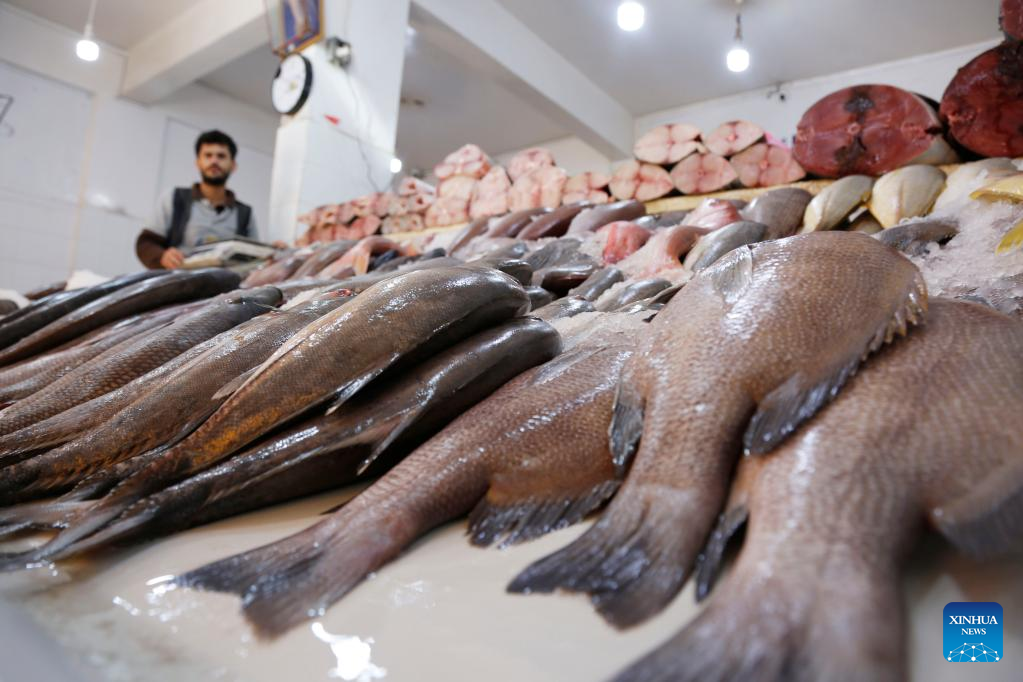
A fishmonger shows prawns at a market in Sanaa, Yemen, March 7, 2023. Since the Yemeni government imposed a ban on fish exports in February, which was aimed at alleviating food shortage and stabilizing local prices, the fish markets across the war-torn country have witnessed a sharp drop in prices and sales boom. However, the well-intentioned measure angered the country's fishermen.(Photo by Mohammed Mohammed/Xinhua)
SANAA, March 23 (Xinhua) -- Since the Yemeni government imposed a ban on fish exports in February, which was aimed at alleviating food shortage and stabilizing local prices, the fish markets across the war-torn country have witnessed a sharp drop in prices and sales boom. However, the well-intentioned measure angered the country's fishermen.
Every day, trucks loaded with fresh fish from Yemen's coastal cities arrive at the Al-Belaily fish market in Sanaa, the capital controlled by the Houthi militia.
"We used to have fish shipments only three times a week. Now we have them every day from all the Yemeni coasts of Hadramout, Mukalla, Ghaydah, Hodeidah, Midi, and Luhaia," Mohammed Al-Zubaidy, a fishmonger at the market, told Xinhua.
"My business has improved. I used to sell 100 kg of fish a day, now I can sell 200 kg after the prices went down. More customers are coming," Al-Zubaidy said while serving a dozen customers standing in front of his fish stall.
Fish, among other essential foodstuffs, is one of the few commodities that can be moved across the frontlines between the internationally-recognized government and the Houthi militia, thanks to the mediation efforts from the United Nations.
Saleh Maiad, a Sanaa resident who just bought 3 kg of fish, said he often came to the market in the morning to avoid crowds. "Before the ban, I could not afford 2 kg of fish a week for my family of nine," he said happily, hoping that the prices would decrease further.
Fish traders in Sanaa said prices have fallen over 30 percent since the beginning of March.
In the government-controlled ports, the prices drops are even steeper. According to local reports, a kilo of tuna now sells for about 3,000 Yemeni riyals (about 3.60 U.S. dollars), down from 8,000 riyals a month earlier in Al-Mukalla and more than 12,000 riyals in Aden. The price of Grouper has fallen from 10,000 to less than 1,500 Yemeni riyals a kilo.
Ismail Al-Akwa who also came to buy "cheap fish" at the Al-Belaily market said he still could barely afford other food like chicken, beef, and wheat. "The decrease in fish prices is good news but the food, in general, is still incredibly expensive," he added.
However, not all Yemenis can benefit from lower fish prices. Some fishermen have complained about the ban on fish exports. They said they faced losses due to overstocking and high costs of fuel and ice. They urged the government to lift the ban or subsidize their expenses.
"We are paying the price," said a fish trader who had just transported his fish from Hodeidah to Sanaa.
"We are honest and hard-working people. Why should we sacrifice our money to support the poor? We are also poor," he said, asking not to be named.
Salem Abdullah Al-Soqotri, minister of agriculture, irrigation, and fisheries in the Yemeni government, said that the ban was intended to create a balance between fish supplies to the local market and fish exports, adding that his ministry would monitor the implementation of the decision and provide daily updates on fish prices and catches.
He also promised to loosen the ban by allowing some species to be exported and lifting it completely when supplies in local markets have stabilized.
Yemen has a long coastline of around 2,000 kilometers and rich fishing grounds offshore. The fishing industry used to be a booming sector that provided livelihoods for thousands of Yemenis and contributed to the national economy. Yemenis also used to consume a lot of fish in their diet.
However, since the civil war erupted in late 2014 between the Iran-backed Houthi militia and the Saudi-backed Yemeni government, the fishing industry has faced many challenges that have hampered its production and potential.
The civil war has caused what the United Nations calls the worst humanitarian crisis in the world, with more than 17 million people in need of food aid and over 2 million children suffering from acute malnutrition. The United Nations has been trying to broker a political settlement between the warring parties, but there is no end in sight yet. ■

Fishmongers sell fish at a market in Sanaa, Yemen, March 7, 2023. Since the Yemeni government imposed a ban on fish exports in February, which was aimed at alleviating food shortage and stabilizing local prices, the fish markets across the war-torn country have witnessed a sharp drop in prices and sales boom. However, the well-intentioned measure angered the country's fishermen.(Photo by Mohammed Mohammed/Xinhua)

A customer buys fish at a market in Sanaa, Yemen, March 7, 2023. Since the Yemeni government imposed a ban on fish exports in February, which was aimed at alleviating food shortage and stabilizing local prices, the fish markets across the war-torn country have witnessed a sharp drop in prices and sales boom. However, the well-intentioned measure angered the country's fishermen.(Photo by Mohammed Mohammed/Xinhua)

A fishmonger sells fish at a market in Sanaa, Yemen, March 7, 2023. Since the Yemeni government imposed a ban on fish exports in February, which was aimed at alleviating food shortage and stabilizing local prices, the fish markets across the war-torn country have witnessed a sharp drop in prices and sales boom. However, the well-intentioned measure angered the country's fishermen.(Photo by Mohammed Mohammed/Xinhua)



